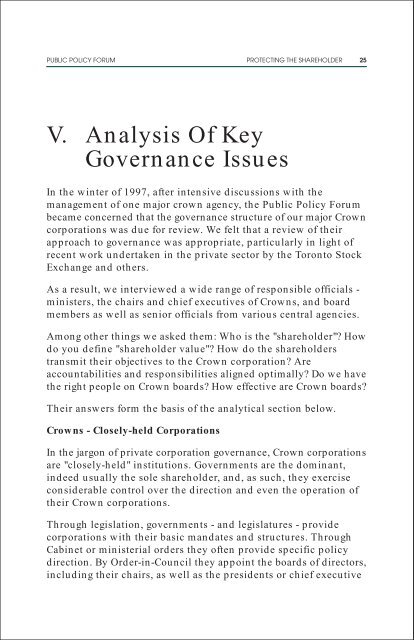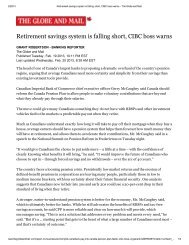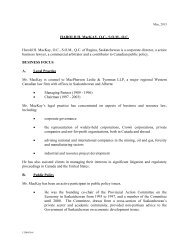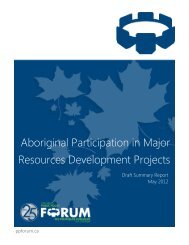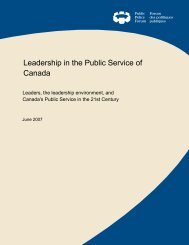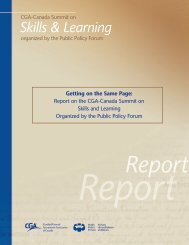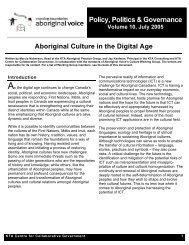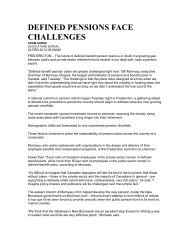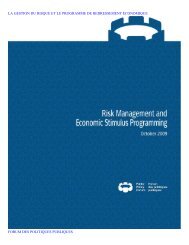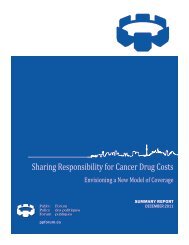Protecting the Shareholder - Public Policy Forum
Protecting the Shareholder - Public Policy Forum
Protecting the Shareholder - Public Policy Forum
You also want an ePaper? Increase the reach of your titles
YUMPU automatically turns print PDFs into web optimized ePapers that Google loves.
PUBLIC POLICY FORUM PROTECTING THE SHAREHOLDER 25 PUBLIC POLICY FORUM PROTECTING THE SHAREHOLDER 26V. Analysis Of KeyGovernance IssuesIn <strong>the</strong> winter of 1997, after intensive discussions with <strong>the</strong>management of one major crown agency, <strong>the</strong> <strong>Public</strong> <strong>Policy</strong> <strong>Forum</strong>became concerned that <strong>the</strong> governance structure of our major Crowncorporations was due for review. We felt that a review of <strong>the</strong>irapproach to governance was appropriate, particularly in light ofrecent work undertaken in <strong>the</strong> private sector by <strong>the</strong> Toronto StockExchange and o<strong>the</strong>rs.As a result, we interviewed a wide range of responsible officials -ministers, <strong>the</strong> chairs and chief executives of Crowns, and boardmembers as well as senior officials from various central agencies.Among o<strong>the</strong>r things we asked <strong>the</strong>m: Who is <strong>the</strong> "shareholder"? Howdo you define "shareholder value"? How do <strong>the</strong> shareholderstransmit <strong>the</strong>ir objectives to <strong>the</strong> Crown corporation? Areaccountabilities and responsibilities aligned optimally? Do we have<strong>the</strong> right people on Crown boards? How effective are Crown boards?Their answers form <strong>the</strong> basis of <strong>the</strong> analytical section below.Crowns - Closely-held CorporationsIn <strong>the</strong> jargon of private corporation governance, Crown corporationsare "closely-held" institutions. Governments are <strong>the</strong> dominant,indeed usually <strong>the</strong> sole shareholder, and, as such, <strong>the</strong>y exerciseconsiderable control over <strong>the</strong> direction and even <strong>the</strong> operation of<strong>the</strong>ir Crown corporations.Through legislation, governments - and legislatures - providecorporations with <strong>the</strong>ir basic mandates and structures. ThroughCabinet or ministerial orders <strong>the</strong>y often provide specific policydirection. By Order-in-Council <strong>the</strong>y appoint <strong>the</strong> boards of directors,including <strong>the</strong>ir chairs, as well as <strong>the</strong> presidents or chief executiveofficers whose compensation are set by Cabinet as well. Crowncorporation budgets are subject to <strong>the</strong> overall fiscal policy of <strong>the</strong>government and annual corporate plans are submitted for reviewby <strong>the</strong> responsible ministers and/or Treasury Board.Given that shareholder governments retain so much power andinfluence over <strong>the</strong>ir Crowns, it is worth asking how independentCrown corporation directors really are (even if <strong>the</strong>y are largely"unrelated" by TSE guideline standards) and how much genuineauthority <strong>the</strong>y exert over <strong>the</strong> corporation. Or are <strong>the</strong>y, in fact, morein <strong>the</strong> nature of advisory committees similar to those which havereplaced supposed independent boards of directors in many privateCanadian corporations which have a dominant or controllingshareholder, often a nonCanadian one? This move to <strong>the</strong> advisorycommittee model appears to acknowledge <strong>the</strong> hard fact thatcontrolling shareholders call <strong>the</strong> shots in most matters of importance- as well as respond to concerns of directors about liability. (Thisconcern does not exist in <strong>the</strong> case of Crowns. Directors are notpersonally liable for actions undertaken by <strong>the</strong> Crown agency ofwhich <strong>the</strong>y are a director.)One option, <strong>the</strong>n, might be to apply this private sector model tocrown corporations, that is to formally redesignate <strong>the</strong>ir boards ofdirectors as advisory committees. It would <strong>the</strong>n be clear that <strong>the</strong>irrole is not to make decisions, but simply to advise management,and perhaps <strong>the</strong> shareholder, on relevant issues based on <strong>the</strong>directors "once removed" assessments and experience, including<strong>the</strong>ir geographic and demographic perspectives.The problem with this approach is that it would virtually destroyany notion that <strong>the</strong>se corporations are, in fact, arms length from<strong>the</strong>ir governments and independent of <strong>the</strong>m in day-to-dayoperations and content. One would end up with an even moredirect-line relationship between Crown management and <strong>the</strong>government with no one effectively in between to provide somecheck on both sides. It would be better, we suggest, for Crown boardsto be real boards, and for any impediments to that reality to beopenly examined and corrected.Most of <strong>the</strong> boards examined for this study do perform some of <strong>the</strong>


